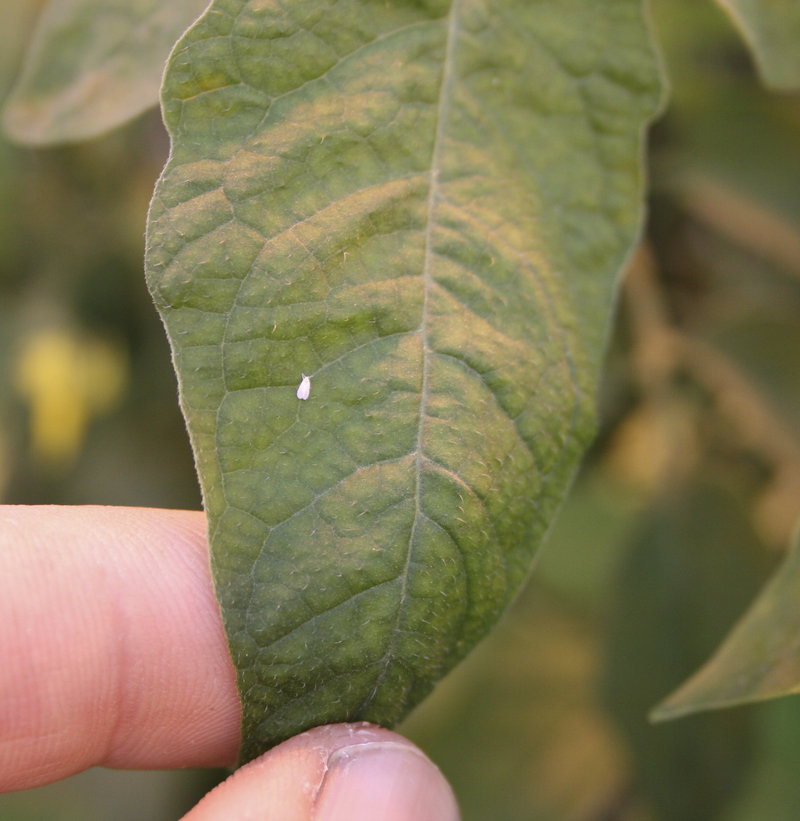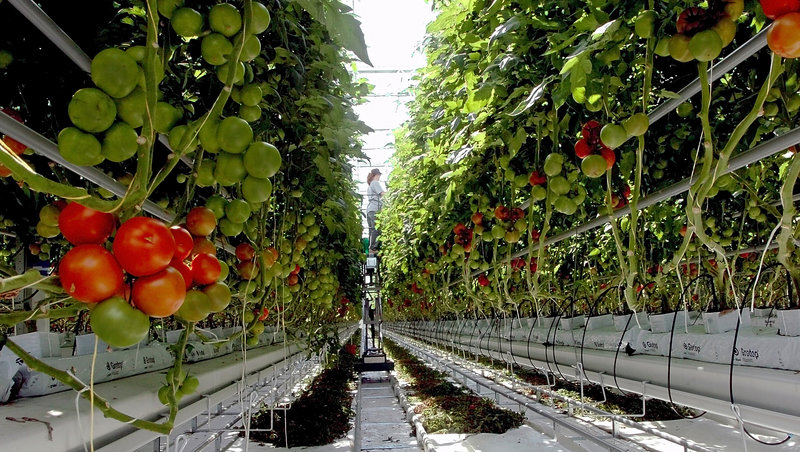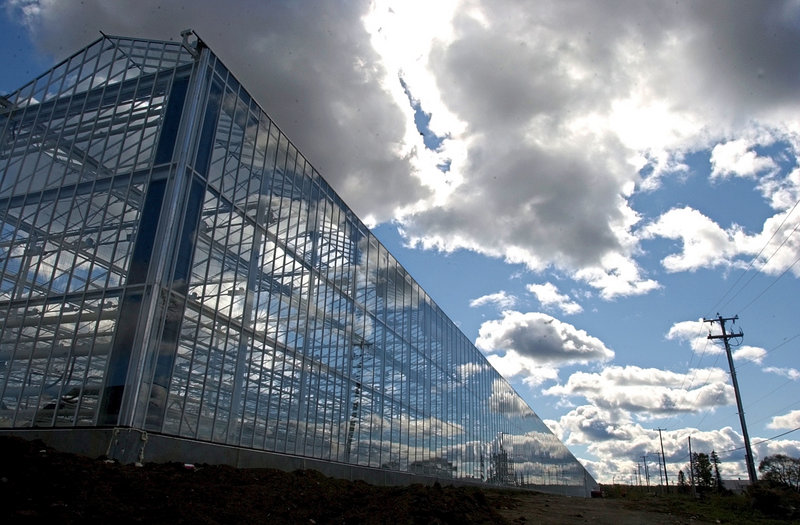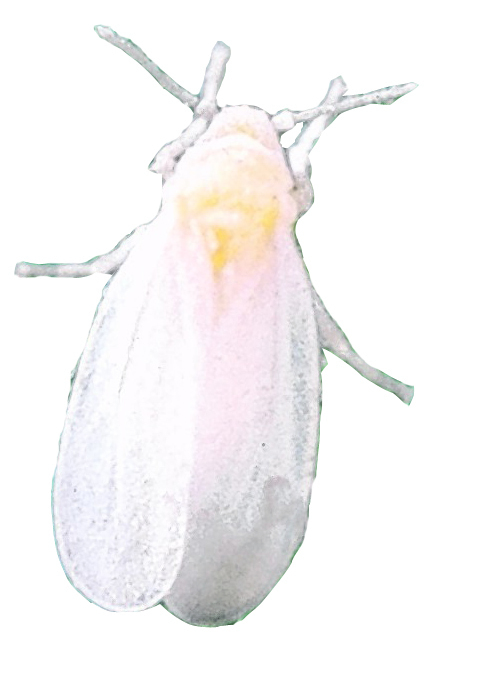MADISON – Backyard Farms, which produces more than 27 million pounds of tomatoes a year, says an infestation of whiteflies in its greenhouses will force the company to destroy its entire crop of half-a-million plants and start over.
The clean-out will disrupt its tomato-growing operation and deliveries for as long as 10 weeks.
Backyard Farms, which ships tomatoes across the Northeast to about 50 retailers ranging from Hannaford to Whole Foods to Walmart, decided to clean out both of its greenhouses, which cover 42 acres, in an effort to fully eliminate any problems, said President and CEO Chuck Green. The company will destroy all of its plants, sanitize the greenhouses and grow a new crop, Green said.
“The decision was made that if we can’t deliver the best-quality product, we would do a total clean-out and sanitation effort,” he said. “It’s like scrubbing a surgical room. . . . You won’t see fruit with our name on it in stores until mid- to late October.”
Backyard Farms opened a 24-acre operation in 2007, growing tomatoes year-round, and has expanded since then, supplying tomatoes to restaurants and retailers. The company grows tomatoes year-round.
In glass-enclosed greenhouses, it grows plants hydroponically, in a nutrient solution rather than in soil. Workers wear sanitized “clean suits” when they tend plants to prevent the spread of disease, Green said. “We have extreme biocontrols in place,” he said.
Whiteflies, which look like tiny white moths, suck away plant juices and cause leaves to yellow or die. The insects also excrete a sticky honeydew that often causes a black, sooty mold on the leaves. The mold can be washed away easily and is not harmful to humans, said Jim Dill, pest management specialist for the University of Maine’s Cooperative Extension.
“It’s a very common problem for greenhouses. It usually doesn’t get out of control, but if it does, there are biocontrol organisms that can help,” said Dill. “It’s not harmful to people at all. The real damage is sucking the juices out of the fruit.”
Greenhouse plants are more susceptible to whiteflies than outdoor farms, Dill said.
Backyard Farms began notifying customers about two weeks ago that deliveries would be disrupted. It will remove all of its signs from stores so there will be no confusion about what produce is for sale, Green said.
“We’ve been very lucky. Our customers have been very supportive and warm. I think they almost feel worse for us than we feel,” he said. Backyard Farms also notified state and local officials, which it was not required to do, Green said.
Hannaford, which was Backyard Farms’ first major customer, said it remains supportive of the company and will restock the produce once it is available again.
“Our merchandising team was notified. In agriculture, problems can happen,” said Hannaford spokesman Michael Norton. “We’re feeling we’ll be back with Backyard Farms at the earliest possible date. We’ve been with them from the beginning. If we have to find an alternative vendor, we will do what we need to do, but we’ll be back with Backyard Farms as soon as possible.”
Green said Backyard Farms plans to keep its 200 employees on the payroll throughout the clean-out and replanting process.
“We’re not laying anyone off. The rationale is that in good times and bad times, you have to walk the walk and talk the talk of taking care of people,” he said. “It’s a risk you take in agriculture.”
Green would not say how much money Backyard Farms will lose by destroying its plants, or how much the clean-out will cost.
“It’s a tremendous hit to our business,” he said.
The company has hired plant specialists and plant pathogen specialists to make sure the whitefly problem doesn’t occur again. Green declined to name the specialists.
When the company resumes production, it will test all of the seeds and plants to make sure there’s no disease, Green said. It will also use bugs that will be predators to any whiteflies.
The whitefly problem has not been widespread in Maine, other farmers said.
Sean Hagan of Left Field Farm in Bowdoinham said he hasn’t seen whiteflies in his greenhouses. His tomatoes and peppers are grown in open-sided greenhouses, rather than the type of glass-enclosed greenhouses that Backyard Farms uses.
“That’s more of an indoor problem,” Hagan said. “I haven’t seen any issues.”
Jessica Hall can be contacted at 791-6316 or at:
jhall@pressherald.com
CORRECTION: Because of a reporter error, a story on Page 1 Wednesday about tomato grower Backyard Farms gave an incorrect description of the company. It is not an organic farm.
Send questions/comments to the editors.






Success. Please wait for the page to reload. If the page does not reload within 5 seconds, please refresh the page.
Enter your email and password to access comments.
Hi, to comment on stories you must . This profile is in addition to your subscription and website login.
Already have a commenting profile? .
Invalid username/password.
Please check your email to confirm and complete your registration.
Only subscribers are eligible to post comments. Please subscribe or login first for digital access. Here’s why.
Use the form below to reset your password. When you've submitted your account email, we will send an email with a reset code.